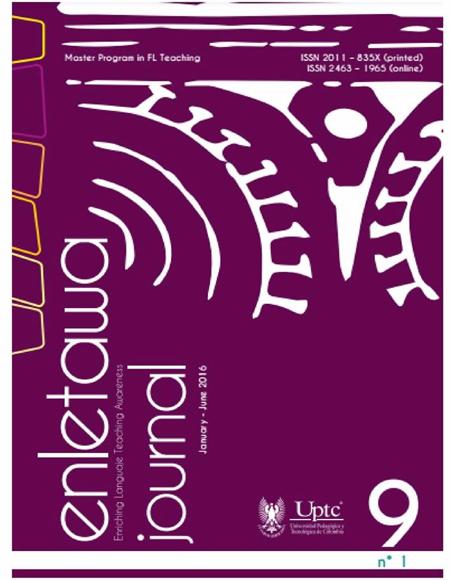Textbooks Decontextualization within Bilingual Education in Colombia

Abstract
Studies about textbooks proposed by authors such as Savignon (1997, 2001); Tomlinson (2003); Núñez, Téllez, Catellanos and Ramos (2009); Ramos and Aguirre (2014), demonstrate that these do not always match the context where English as a Foreign Language (EFL) is being learned. As a consequence, learning English can become arduous and meaningless, i.e., non-natural settings are created to learn the language (Ordóñez, 2011), and textbooks do not prepare learners for real language use (Tomlinson, 2003). In Colombia, English textbooks are included as a means to support language learning under bilingualism policies. However, their authenticity and cultural content are not accurate within the national context. This article presents an overview of the concepts of bilingualism and bilingual education, followed by a discussion concerning the textbooks, as facilitators in learning a language. Some conclusions are also offered regarding the importance of using contextualized materials when learning EFL.Keywords
Textbooks, Context, English as a Foreign Language, Bilingualism Policies, Bilingualism, Bilingual Education, Materials
References
- Alvarez, J. (2008, October). Educational commercialism: Is it overtaking EFL in Colombia? ASOCOPI Newsletter, p. 7. Retrieved from:http://www.academia.edu/999811/Educational_commercialism_is_it_overtaking_EFL_in_Colombia
- Bachman, L. (1999). Fundamental considerations in language testing. Oxford, UK: Oxford University Press.
- Baker, C. (2001). Foundations of bilingual education and bilingualism. Buffalo, NY: Multilingual Matters.
- Baker, C. (2002). Bilingual education. In Kaplan, R (Ed.), The Oxford handbook of applied linguistics (294-305). Oxford: Oxford University Press.
- Banfi, C., and Day, R. (2004). The evolution of bilingual schools in Argentina. International Journal of Bilingual Education and Bilingualism, 7, 398-411. DOI: https://doi.org/10.1080/13670050408667822
- Burns, D. (1984). Quechua/Spanish bilingual education and language policy in Bolivia (1977-1982). International Education Journal, 1, 197-220.
- Brown, J. (1995). The elements of language curriculum: A systematic approach to program development. Boston: Heinle and Heinle.
- Carvajal, R. (2012). The way students see an English language textbook. Enletawa Journal, 5, 115-124.
- Celce-Murcia, M. (2002). On the use of selected grammatical features in academic writing. In M. Schleppegrell and C. Colombi (Ed.) Developing advanced literacy in first and second languages: Meaning with power (pp.143-158). Mahwah, NJ: Erlbaum.
- Chiswick, B., Patrinos, H., and Hurst, M. (2000). Indigenous language skills and the labor market in a developing country: Bolivia. Economic Development and Cultural Change, 48, 349-367. DOI: https://doi.org/10.1086/452462
- Ciechanowski, K. (2009). "A squirrel came and pushed earth": Popular cultural and scientific ways of thinking for ELLs. Reading Teacher, 62 (7), 558-568. DOI: https://doi.org/10.1598/RT.62.7.2
- Cummins, J., and Swain, M. (1986). Bilingualism in education: Aspects of theory, research, and practice. New York: Longman.
- Cummins, J. (2001). Bilingual children’s mother tongue: Why is it important for education? Sprogforum, 19, 5-20.
- De Mejía, A.M. (2004). Bilingual Education in Colombia: Towards and integrated perspective. Bilingual Education and bilingualism, 7, 381-397. DOI: https://doi.org/10.1080/13670050408667821
- De Mejía, A. M. (2006a). Bilingual education in Colombia: Towards a recognition of languages, cultures and identities. Colombian Applied Linguistics Journal, 8, 152-168. DOI: https://doi.org/10.14483/22487085.176
- De Mejía, A. M., Ordóñez, C., and Fonseca, L. (2006b). Estudio investigativo sobre el estado actual de la educación bilingüe (inglés-español) en Colombia. Unpublished research report. Bogotá: Ministerio de Educación Nacional de Colombia, Universidad de los Andes.
- Council of Europe (2004). Common European framework of reference for languages: Learning, teaching, assessment.
- Genesee, F. (2004). What do we know about bilingual education for majority language students? In T, Bathia and W. Ritchie (Ed.) The handbook of bilingualism, (pp. 547-576). Oxford, UK: Blackwell Publishing Ltd. DOI: https://doi.org/10.1002/9780470756997.ch21
- Goldstein, B. (2014). La necesidad de un enfoque intercultural. Ruta Maestra. Ed. 11. Retrieved from http://www.santillana.com.co/rutamaestra/edicion-11/articles/2
- Gómez, L. (2015). The cultural content in EFL textbooks and what teachers need to do about it. PROFILE Issues in Teachers' Professional Development, 17(2), 167-187. Retrieved from http://dx.doi.org/10.15446/profile.v17n2.44272 DOI: https://doi.org/10.15446/profile.v17n2.44272
- Grosjean, F. (1982). Life with two languages: An introduction to bilingualism. Cambridge, MA: Harvard University Press.
- Harwood, N. (2013). English language teaching textbooks: Content, consumption, production. (Ed.). London, UK: Palgrave Macmillan.
Downloads
Download data is not yet available.